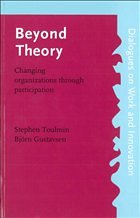Main description:
Action Research is one of the most practical and down-to-earth ways of doing research into working life. Beyond Theory draws on examples and actual cases to discuss action research within the framework of the modern, and postmodern, theory of science debate. While action research has been much criticized by the traditionalists, the book reflects a convergence between action research and positions emerging out of the critique of scientific traditionalism. Discussions between these two fields of knowledge, originally so very different, can enrich both. The book will be useful not only to researchers and academics but to anyone who is interested in the role and use of knowledge in social and organizational development.
Table of contents:
- Preface
- Introduction
- 1. Development and the Social Sciences: An uneasy relationship
- 2. Workplace Development and Research: Two examples
- 3. Creating Reflective Dialogue
- 4. Workplace development, Gender and Communicative Competence
- 5. Strategic Management from the Bottom Up: The start of a process of managerial, organizational andinstitutional change
- 6. Action Research and Regional Development
- 7. The Development Organization as Communicative Instumentation: Experiences from the Karlstadprogram
- 8. Searching for a Program in National Participation: An action research experiment in Turkey
- 9. 6;This is Not the Whole Story'': On the demand for scientific reports of actionresearch
- 10. Pragmatizing Communicative Reason
- 11. Reflections on the Epigenetics Significance of Action Research
- 12. Concluding Methodological Reflections: Élitism and democracy among the sciences
- About the Authors
- Index
Action Research is one of the most practical and down-to-earth ways of doing research into working life. Beyond Theory draws on examples and actual cases to discuss action research within the framework of the modern, and postmodern, theory of science debate. While action research has been much criticized by the traditionalists, the book reflects a convergence between action research and positions emerging out of the critique of scientific traditionalism. Discussions between these two fields of knowledge, originally so very different, can enrich both. The book will be useful not only to researchers and academics but to anyone who is interested in the role and use of knowledge in social and organizational development.
Table of contents:
- Preface
- Introduction
- 1. Development and the Social Sciences: An uneasy relationship
- 2. Workplace Development and Research: Two examples
- 3. Creating Reflective Dialogue
- 4. Workplace development, Gender and Communicative Competence
- 5. Strategic Management from the Bottom Up: The start of a process of managerial, organizational andinstitutional change
- 6. Action Research and Regional Development
- 7. The Development Organization as Communicative Instumentation: Experiences from the Karlstadprogram
- 8. Searching for a Program in National Participation: An action research experiment in Turkey
- 9. 6;This is Not the Whole Story'': On the demand for scientific reports of actionresearch
- 10. Pragmatizing Communicative Reason
- 11. Reflections on the Epigenetics Significance of Action Research
- 12. Concluding Methodological Reflections: Élitism and democracy among the sciences
- About the Authors
- Index

